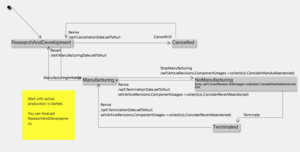OCLOperators oclIsInState
(Created page with "oclIsInState checks an object that has 1 or more state machines defined - if one of these state machines are currently in the state in question.<blockquote>Article.allinstance...") |
No edit summary |
||
| (11 intermediate revisions by 4 users not shown) | |||
| Line 1: | Line 1: | ||
oclIsInState checks an object | <message>Write the content here to display this box</message> | ||
[[File:2017-09-14 14h02 09.png|none|thumb]] | oclIsInState checks whether an object has 1 or more state machines defined - and if one of these state machines is currently in the state in question. | ||
Article.allinstances->select(a|a.oclIsInState(#Manufacturing)) | |||
A state machine can be defined like this: | |||
[[File:2017-09-14 14h02 09.png|none|thumb]]'''See also:''' [[Documentation:State value as a string|State value as a string]] | |||
{{Edited|July|12|2025}} | |||
[[Category:OCL]] | |||
[[Category:Intermediate]] | |||
Latest revision as of 04:59, 24 February 2025
This page was created by Hans.karlsen on 2017-09-14. Last edited by Stephanie on 2025-02-24.
oclIsInState checks whether an object has 1 or more state machines defined - and if one of these state machines is currently in the state in question.
Article.allinstances->select(a|a.oclIsInState(#Manufacturing))
A state machine can be defined like this:
See also: State value as a string

